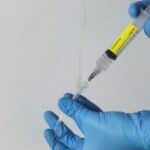Demerol, the brand name for the opioid painkiller meperidine, is a prescription drug used to treat severe pain. Although it can be effective in treating pain, long-term Demerol use can result in opioid dependence.
If you become dependent, you may experience withdrawal symptoms if you stop or reduce Demerol abuse. Demerol withdrawal symptoms can begin within the first 6-12 hours after stopping use. Symptoms likely peak within 72 hours and start to fade over the next 4-10 days.
How Demerol Works
Demerol is an opioid analgesic (pain reliever) that interacts with opioid receptors in the central nervous system. Activating opioid receptors can help relieve pain but may also cause feelings of relaxation and euphoria, which is why it is commonly abused.
Additional side-effects of Demerol may include:
- constipation
- drowsiness
- sedation
- slow heart rate
- low blood pressure
- slow breathing
- confusion
Long-term Demerol use can cause opioid dependence, which means the body depends on the drug to function. If you quit opioids “cold turkey” or wean off them too quickly, you may experience opioid withdrawal symptoms.
Demerol Withdrawal Timeline
The severity of withdrawal symptoms can vary, depending on the strength of Demerol, frequency of use, and how long it was used for. Many withdrawal symptoms produce symptoms opposite to the effects of the drug.
Stage 1: Acute Withdrawal
The onset of withdrawal symptoms can occur within the first 6-12 hours after the last dose of Demerol. Acute withdrawal symptoms may peak around 72 hours and improve over the next 4-10 days.
Acute symptoms of withdrawal may include:
- muscle aches
- loss of appetite
- nausea
- anxiety
- mood changes
- irritability
- difficulty sleeping
- chills
- impaired concentration
- sweating
- runny nose
- diarrhea
Symptoms can be mild to severe but many people experience intense cravings that may cause a relapse. Once you stop using opioids, your tolerance may be reduced. Using opioids after a period of stopping increases the risk of a life-threatening overdose.
Stage 2: Long-Term Withdrawal
According to the Substance Abuse and Mental Health Services Administration (SAMHSA), some people may experience symptoms after acute withdrawal symptoms disappear.
Long-term withdrawal symptoms may include:
- anxiety
- depression
- impaired sleep
- fatigue
- irritability
- intense cravings
- poor concentration
Long-term withdrawal, also known as post acute withdrawal syndrome, can persist for months after stopping Demerol.
Demerol Withdrawal Treatment & Detox
If you want to stop using Demerol, a medical detox program can help you recover in a safe environment.
A professional detox program offers 24/7 care from medical professionals who monitor your vital signs and symptoms. Detox is an important step in recovery because it helps prepare you for a drug rehab program.
Detox Medications
If you are experiencing severe or uncomfortable symptoms, you may receive medications to help you sleep and make you more comfortable.
Detox medications may include:
- clonidine, for anxiety and blood pressure
- loperamide, for diarrhea
- melatonin, a sleep-aid
- methadone, for cravings
Demerol Addiction Treatment
If you experience withdrawal symptoms and think you may be addicted to Demerol, help is available. After completing a detoxification program, you can seek treatment in an inpatient or outpatient treatment center.
Depending on the level of care that meets your needs, treatment may include:
Medication-Assisted Treatment (MAT)
A MAT program involves the use of FDA-approved medications and behavioral therapy to reduce opioid cravings and the risk of drug abuse. MAT medications include Suboxone (buprenorphine/naloxone), methadone, and naltrexone.
Inpatient Treatment
An inpatient treatment center requires you to live at the treatment facility while engaging in an intensive daily schedule of therapies and healthy activities.
Your treatment services will be tailored to fit your needs and may include behavioral therapy, support groups, yoga, and meditation.
Outpatient Treatment
Outpatient rehab varies in intensity but allows you to live at home and travel to the treatment center for scheduled sessions.
At Northeast Addictions Treatment Center, we offer a variety of comprehensive outpatient treatment options, including group therapy, family therapy, and individual counseling.
If you or a loved one would like to learn more about our opioid addiction treatment programs, please reach out to us today.
Sources
Written by
Northeast Addition Editorial Team
©2024 Northeast Addition Center | All Rights Reserved
This page does not provide medical advice.




